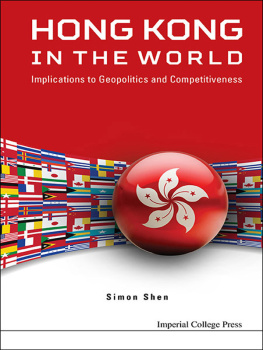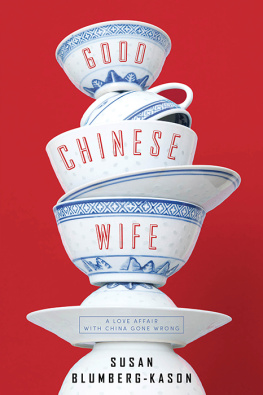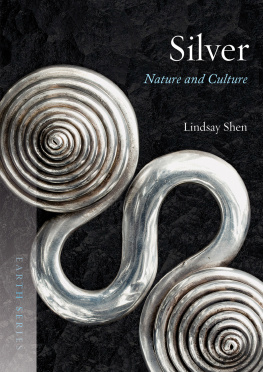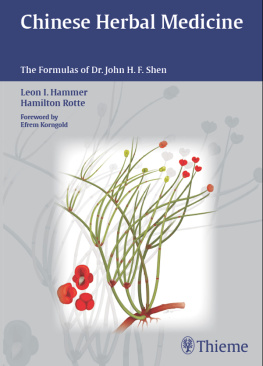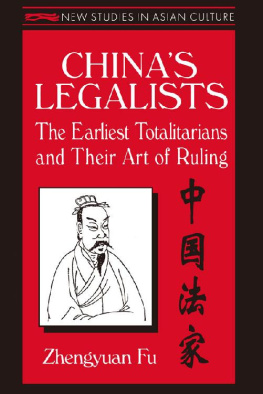
SIX RECORDS OF A FLOATING LIFE
ADVISORY EDITOR: BETTY RADICE
LEONARD PRATT began his Chinese studies as an undergraduate at the University of Michigan, and continued them in the graduate and fellowship programmes at Columbia University. He furthered his Chinese language studies in Taiwan from 1969 to 1974, and he is now the bureau chief for NBC News in Hong Kong.
CHIANG SU-HUI was born and educated in Taiwan. She has a degree in Chinese law, and has worked as an educator, writer and broadcaster.
Shen Fu
Six Records of a Floating Life
Translated with an Introduction and Notes by
Leonard Pratt and Chiang Su-hui
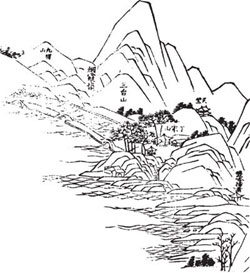
Penguin Books
PENGUIN BOOKS
Published by the Penguin Group
Penguin Books Ltd, 80 Strand, London WC2R 0RL, England
Penguin Putnam Inc., 375 Hudson Street, New York, New York 10014, USA
Penguin Books Australia Ltd, 250 Camberwell Road, Camberwell, Victoria 3124, Australia
Penguin Books Canada Ltd, 10 Alcorn Avenue, Toronto, Ontario, Canada M4V 3B2
Penguin Books India (P) Ltd, 11 Community Centre, Panchsheel Park, New Delhi 110 017, India
Penguin Books (NZ) Ltd, Cnr Rosedale and Airborne Roads, Albany, Auckland, New Zealand
Penguin Books (South Africa) (Pty) Ltd, 24 Sturdee Avenue, Rosebank 2196, South Africa
Penguin Books Ltd, Registered Offices: 80 Strand, London WC2R 0RL, England
www.penguin.com
This translation first published 1983
27
All rights reserved
Maps on pages 1667 by Reginald Piggott
Except in the United States of America, this book is sold subject to the condition that it shall not, by way of trade or otherwise, be lent, re-sold, hired out, or otherwise circulated without the publishers prior consent in any form of binding or cover other than that in which it is published and without a similar condition including this condition being imposed on the subsequent purchaser
9780141920344
Contents
Now the heavens and earth are the hostels of creation; and time has seen a full hundred generations. Ah, this floating life, like a dream True happiness is so rare!
LI PO, On a Banquet with my Cousins
on a Spring Night in the Peach Garden
Introduction
Shen Fu was born in Soochow in the latter part of the eighteenth century, at the height of the Ching Dynasty. He was a government clerk, a painter, occasional trader, and a tragic lover, and in his mid forties he set out his life in six moving records that have delighted the Chinese ever since they came to light in the nineteenth century.
While it is much more, the Six Records is known among the Chinese as a love story. As such, from a Western point of view, it is unique. For though it is indeed a true love story of Shen Fu and his wife Yn, it is a love story set in a traditional Chinese society and thus their love coexists and intermingles with Shen Fus affairs with courtesans, and with his wifes attempts to find him a concubine. And yet, for all that, it is none the less love.
The role of the courtesan as described in the Six Records is an example of what makes the book a valuable social document. It is difficult for Westerners to understand just what a courtesan in China was, because the only equivalent we have for the role is a prostitute. But a courtesan properly called was respectable and respected, and her sexual favours were by no means necessarily for sale. As van Gulik has described in his classic Sexual Life in Ancient China (Humanities Press, Atlantic Highlands, N.J., 1974), a courtesan could often be more independent and powerful than the men she ostensibly served. It is this kind of small but significant alteration to our perceptions and presumptions which the Six Records can effect that makes it so important a book for Westerners.
Chinese readers find something else in it. It must be recalled how common arranged marriages were among the Chinese until quite recently. Even now, a great deal of parental influence, or economic or social coercion, is still present as an influence in the choice of marriage partners in many Chinese societies.
And so a book arising out of the Imperial literary tradition that extolled enduring, romantic love easily became, and has remained, a favourite among Chinese readers: it has recently been reissued in China by the Peoples Literature Publishing Society, and is certainly the first primarily romantic book to come out in China for decades.
Shen Fu has described his life with his wife in what is probably the most frank and moving story to come to us from the literature of his time. He has given us a remarkable picture of Yn, his child love and his wife. Her life was hard but she played on all its graces, and Shen Fus portrait of her manages to infuse the greatest tenderness into what is one of the most realistic accounts of the life of a woman ever given in traditional Chinese literature.
The books remarkable frankness is broader than that, however. Official literature of the Imperial period, of course, tells us little of the daily life of the more ordinary Chinese people. Novels, plays, and tales of mystery do tell us a bit, but are often so taken up with details of their plots that there is little space left over to tell how people living in China then actually spent their time. The Six Records does tell us in great detail, while managing to avoid many of what must seem to Western readers to be the convolutions that plague so much Chinese popular literature of the time. Fortunately for us, Shen Fu accomplished a rare feat in traditional China: he became literate without becoming a literatus.
Shen Fu was, by his standards and by our own, a conspicuous failure in many ways. The highest he rose officially was to the position of private secretary to a powerful friend, a role that fell to many luckless literati of the Ching. He was not much of a painter, he was a poor businessman frequently in debt, and by the end of his book he seems to have become entirely estranged from his family.
Yet while he was so often a victim, he was still determinedly upright when the chance to be so came his way. He resigned one official post in disgust at his colleagues misdeeds, and he is gentleman enough not to tell us what they did that so upset him. He restored a peasant girl to her family when a man of influence was trying to force her to become a concubine. He was a trusting friend, often to his cost.
If Shen Fu was a failure in so many ways, much of his failure was related to the class from which he came the yamen private secretary. The secretaries in a yamen a government office were failures almost by definition.
The origin of the profession of yamen secretary lay in two uniquely Chinese administrative practices. The first was a rule against assigning magistrates to their home districts. Throughout the post-feudal Chinese dynasties this was a standard means of attempting to ensure that officials administered their districts honestly, unswayed by local loyalties or favourites.
The second practice arose from the Chinese determination that government officials should be scholars first and bureaucrats second. One of the largest empires in the history of the world was administered by a small group of men who, prior to their first assignment, had not had the slightest training in administration, and who knew more about the poetry of a thousand years before than they did about tax law.



